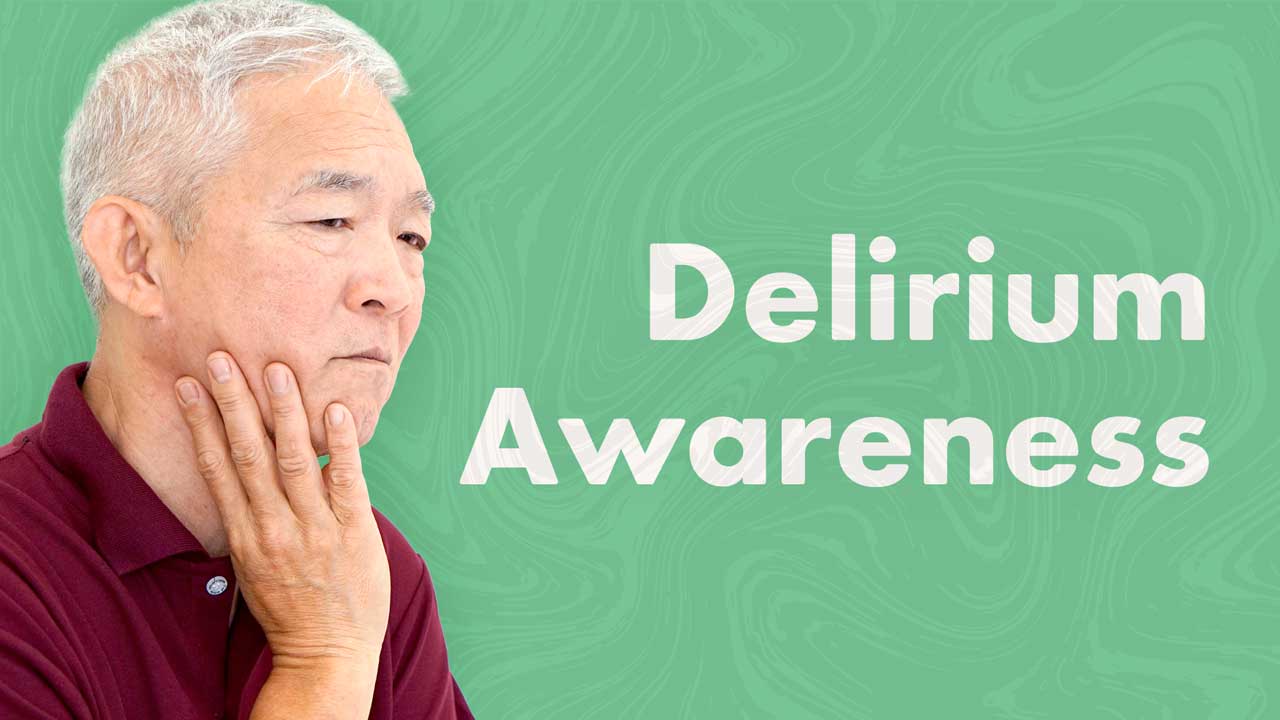When any person, particularly an older adult, accesses a healthcare service, there is a need for health professionals to not only treat their prioritising health concerns but also recognise and treat any other comorbidities they may have concurrently (or consequently) developed during their stay.
One such comorbidity that may occur during a hospital stay is delirium. Any patient who has had surgery, is in pain, has moved beds multiple times or is dehydrated is at risk of delirium.
However, delirium is often confused with dementia due to their many similarities, and differentiating the two conditions can be difficult in older patients.
This article will help you to differentiate between types of cognitive impairment, with a particular focus on delirium and how it can be assessed and treated.
Delirium and Ageing
Memory loss and confusion were once considered a normal part of ageing.
We know this is no longer the case, and older adults can remain alert and capable for as long as they live. Furthermore, while delirium is most common among older adults, it can affect people of any age (ACSQHC 2021).
If confusion and memory problems do set in, it's important to establish what the cause is so that the person can be appropriately treated.
Someone who is cognitively impaired is at a higher risk of experiencing various complications including falls, pressure injuries, functional decline, loss of independence, hospital re-admission, admission to residential aged care and even mortality (ACSQHC 2019; ACI 2015).
Despite the potential devastation it can cause, in Australian hospitals, cognitive impairment remains under-recognised and often misdiagnosed.
About 20% of people admitted to hospital over the age of 70 will have dementia and 10% will have delirium, while 8% will develop delirium while in hospital (ACSQHC 2019).
It’s also possible for a person to experience both dementia and delirium at the same time (Dementia Australia 2020).

What is Cognitive Impairment?
Cognitive impairment is a term used to describe someone’s current state. It generally presents as a state of confusion; loss of memory or attentiveness; difficulty understanding or making sense; difficulty recognising people, places or things; or changes in mood (Healthdirect 2020).
Because cognitive impairment is often misdiagnosed or unidentified, it’s important to understand and differentiate between common forms of cognitive impairment and know how they can affect an individual.
Recognising Delirium
There are many similarities between dementia and delirium, causing them to often be mistaken for one another. Depression can also be potentially confused with both dementia and delirium. Therefore, it’s important to perform a comprehensive assessment of the individual in order to ensure an accurate diagnosis (ACSQHC 2019).
Dementia is a progressive, chronic cognitive impairment that affects memory, judgment, language and the ability to perform everyday tasks. Delirium, on the other hand, is a treatable condition and is an acute disturbance of consciousness, attention and cognition that tends to fluctuate during the course of a day (ACSQHC 2018).
| Dementia | Delirium | Depression | |
|---|---|---|---|
| Duration | Chronic condition that is progressive. | Lasts hours to weeks in duration. | Can last weeks to months to years. |
| Onset | Chronic onset. | Acute onset. | Often abrupt onset. |
| Attention | Generally normal attention. | Impaired or fluctuating attention. | Distractible but minimal impairment of attention. |
| Memory | Recent and remote memory impairment. | Recent and immediate memory impairment. | Islands of intact memory. |
| Alertness | Generally normal alertness. | Fluctuates between lethargic and hyper-vigilant. | Alert. |
| Thought Pattern | May have word-finding difficulties and poor judgment. | Disorganised thinking with slow or accelerated thoughts. | Thinking intact but with themes of helplessness or self-depreciation. |
(Agency for Clinical Innovation 2020)
A person with delirium might:
- Be confused or forgetful
- Have difficulty paying attention
- Act differently from their normal self
- Be agitated, quiet, withdrawn and/or sleepy
- Experience sudden mood changes
- Be disorientated to time and/or place
- Experience changes to their sleeping habits (e.g. drowsiness during the day and staying awake at night)
- Be fearful, distressed, upset, irritable, angry or sad
- Experience hallucinations
- Become incontinent
- Experience delusions or paranoia.
(ACSQHC 2021)
Identifying Delirium Causes and Risk Factors
It’s important to note that delirium has many risk factors and will result from a complex interplay between these risk factors and their health-related events occurring.
This interplay can be demonstrated in instances such as a patient who has pre-existing dementia, is taking multiple medications and also has sensory impairments, who then develops acute delirium after they are given a sedative to help them sleep (ACSQHC 2013).
Some of the risk factors for the development of delirium include:
| Predisposing risk factors | Precipitating risk factors |
|---|---|
|
|
(Adapted from ACI 2020b; ACSQHC 2021)
MISTE
The mnemonic MISTE can be used to help remember and group possible causes of delirium:
- M - metabolic causes: e.g. hyponatraemia, hypoglycaemia, hypoxaemia
- I - infective causes: e.g. urinary tract infection, pneumonia
- S - structural: e.g. subarachnoid haemorrhage, urinary retention
- T - toxic causes: e.g. medications, drugs, poisons
- E - environmental: e.g. being in hospital, social isolation.
(Caplan 2011)

Cognitive Impairment Assessment and Screening
Because of the under-identification of people with cognitive impairment and the potential complications it can cause, it’s important to perform a delirium risk assessment for all patients who present with any of the following:
- Being over 65 years of age (or 45 if an Aboriginal and Torres Strait Islander Person)
- Known cognitive impairment or pre-existing dementia
- Previous history of delirium
- Severe medical illness
- Current hip fracture.
(ACSQHC 2021)
Ensure you are familiar with the delirium assessment tool used in your organisation. Examples include the Confusion Assessment Method (CAM), CAM-intensive care unit (CAMICU), 3-minute diagnostic interview for CAMdefined delirium (3D-CAM), the Nurses Delirium Screening Checklist (NUDESC) and the 4AT (ACSQHC 2019).
Early screening can allow steps to be taken to identify the cause of cognitive impairment and determine if it is a reversible condition, such as delirium as the result of a medication side effect. Treatment can then be commenced and further potential complications avoided (NIA 2021).
Often, initial screening for cognitive impairment takes less than 10 minutes to perform. If the results are positive (i.e. cognitive impairment is present), a more detailed cognitive impairment assessment may then need to be performed. Family members and close companions can be good sources of information about the individual when performing an assessment (NIA 2021).
Delirium Treatment and Interventions
Management of a patient with cognitive impairment should be individualised, however, most organisations will have policies and protocols in place to guide care.
The goal of delirium management is to address its underlying cause and prevent complications such as dehydration, malnutrition, falls and pressure injuries (ACSQHC 2021).
As a general rule, antipsychotic medicines should not be used in the treatment of delirium apart from in very limited circumstances (i.e. short-term use where non-drug strategies are ineffective or there is an imminent risk of harm to the patient or another person). Antipsychotics are typically ineffective and treating the underlying causes of delirium and may cause side effects that can lead to serious harm such as falls, pneumonia and even death (ACSQHC 2021).
Instead, non-medication strategies are recommended. These can include:
- Addressing the underlying cause of delirium
- Managing discomfort and pain
- Monitoring and responding to changes in cognition, behaviour and physical condition
- Assisting with eating and drinking to ensure the patient receives adequate nutrition and hydration
- Minimising bed moves
- Minimising the use of urinary catheters
- Avoiding restrictive practices
- Orientating the person using familiar objects, visible clocks etc.
- Ensuring sensory aids such as glasses, dentures and hearing aids are accessible
- Regulating the patient’s sleep pattern using lighting and activities during the day
- Encouraging participation from the patient’s family and/or carers
- Using interpreters and other communication aids where required.
(ACSQHC 2019)
Preventing Delirium

There are a variety of interventions that should be used together to reduce the risk of delirium. These include:
- Communicating with the patient clearly
- Using eye contact where culturally appropriate
- Conducting a medication review, and reconciling medicines before any transfers of care
- Mobilising the patient at least once or twice every day, and soon after a procedure
- Encouraging the patient to sit out of bed for meals
- Assisting the patient to use sensory aids, and ensuring they work properly
- Ensuring adequate nutrition and hydration
- Regulating bladder and bowel function
- Reorientating and reassuring the patient
- Avoid moving the patient between wards
- Using activities such as reminiscence that promote cognition
- Promoting sleep via non-pharmacotherapy strategies (e.g. earplugs or relaxation techniques)
- Keeping the patient’s environment quiet
- Ensuring clocks and calendars are visible
- Ensuring lighting reflects the time of day
- Managing pain
- Providing oxygen therapy where required.
(ACSQHC 2021)
Conclusion
It’s important to remember that while a person with a new or existing cognitive impairment is in hospital, they are not only dealing with their health condition but also a busy, noisy and unfamiliar environment. This can cause a considerable amount of distress and also exacerbate disorientation, further decreasing the person’s independence and functional ability (ACSQHC 2013).
Note that people who have experienced delirium in the past are at higher risk of developing delirium again in the future (ACI 2020b).
For more information on recognising, managing and preventing delirium, see the ACSQHC Delirium Clinical Care Standard.
Test Your Knowledge
Question 1 of 3
True or False: Delirium, dementia and depression can often coexist and are risk factors for each other.
Topics
References
- ACI Aged Health Network 2015, Key Principles for Care of Confused Hospitalised Older Persons, Agency for Clinical Innovation, viewed 30 May 2022, https://aci.health.nsw.gov.au/__data/assets/pdf_file/0006/249171/CHOPS-key-principles1-2-web.pdf
- Agency for Clinical Innovation 2020a, Assessment of Older People With Confusion, New South Wales Government, viewed 31 May 2022, https://aci.health.nsw.gov.au/chops/chops-key-principles/assessment-of-older-people-with-confusion
- Agency for Clinical Innovation 2020a, Delirium Risk Factors, New South Wales Government, viewed 31 May 2022, https://aci.health.nsw.gov.au/chops/chops-key-principles/delirium-risk-identification-and-preventive-measures/delirium-risk-factors
- Australian Commission on Safety and Quality in Health Care 2019, A Better Way to Care: Safe and High-Quality Care for Patients With Cognitive Impairment or at Risk of Delirium in Acute Health Services, 2nd edn, ACSQHC, viewed 30 May 2022, https://www.safetyandquality.gov.au/sites/default/files/2019-06/sq19-026_acsqhc_bwtc_d21.sk_june-3_accessible_pdf.pdf
- Australian Commission on Safety and Quality in Health Care 2018, About Cognitive Impairment, ACSQHC, viewed 31 May 2022, https://www.safetyandquality.gov.au/our-work/cognitive-impairment/about-cognitive-impairment
- Australian Commission on Safety and Quality in Health Care 2021, Delirium Clinical Care Standard, ACSQHC, viewed 31 May 2022, https://www.safetyandquality.gov.au/our-work/clinical-care-standards/delirium-clinical-care-standard
- Australian Commission on Safety and Quality in Health Care 2013, Handbook for Improving Safety and Providing High Quality Care for People With Cognitive Impairment in Acute Care: A Consultation Paper, viewed 31 May 2022, https://safetyandquality.gov.au/wp-content/uploads/2013/10/Draft-Handbook_Consultation_Improving-Care-for-People-with-Cognitive-Impairment-in-Acute-Care.pdf
- Caplan, G 2011, ‘Managing Delirium in Older Patients’, Australian Prescriber, vol. 34, no. 1, pp. 16-8, viewed 12 September 2019, https://www.nps.org.au/australian-prescriber/articles/managing-delirium-in-older-patients
- Dementia Australia 2020, Delirium and Dementia, Dementia Australia, viewed 31 May 2022, https://www.dementia.org.au/sites/default/files/helpsheets/Helpsheet-DementiaQandA21_Delirium_english.pdf
- Healthdirect 2020, Cognitive Impairment, Healthdirect, viewed 31 May 2022, https://www.healthdirect.gov.au/cognitive-impairment
- National Institute on Aging 2014, Assessing Cognitive Impairment in Older Patients, National Institutes of Health, viewed 31 May 2022, https://www.nia.nih.gov/health/assessing-cognitive-impairment-older-patients
Additional Resources
- Care of Confused Hospitalised Older Persons (CHOPS) | ACI
- A Better Way to Care: Safe and High-Quality Care for Patients With Cognitive Impairment or at Risk of Delirium in Acute Health Services | ACSQHC
- Delirium Clinical Care Standard | ACSQHC
- Delirium and Dementia | Dementia Australia: Centre for Dementia Learning
- Delirium and Depression | Ausmed Lecture
- Delirium, Depression, Dementia and Drugs | Ausmed Lecture
 New
New 
